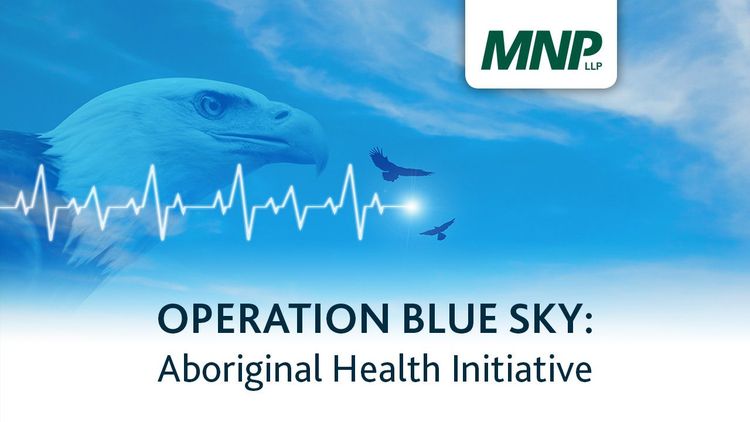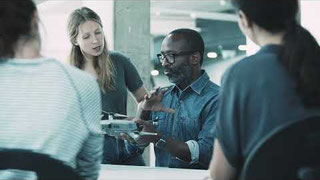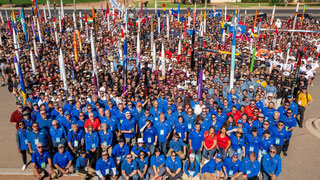MNP, a Canadian accounting, tax and consulting firm serving Aboriginal communities for over 25 years, is interested in crowdsourcing innovative ideas, with the ultimate goal of improving the health and wellness of Canadian Aboriginal communities. MNP does not operate health centres, provide medical services or work in the medical community and will not benefit financially from this effort. This is a philanthropic initiative of MNP who views the HeroX Challenge as an opportunity to use MNP resources and connections to generate innovative ideas to improve the health and wellness of Aboriginal communities using the insights and creativity of the global community.
"The health of our Aboriginal peoples is a national disgrace. If the Aboriginal population was enjoying a state of health similar to that of the overall Canadian population, Canada would probably stand as the healthiest country in the world."
- Parliament of Canada – Standing Senate Committee on Social Affairs, Science & Technology
(December 1999)
|
|
|
FNHMA is proud to be part of this important initiative, Operation Blue Sky, as it seeks to find creative and innovation solutions in First Nations Health.
- Marion Crowe, Executive Director of First Nations Health Managers Association
(February 2015)
|
|
MNP HeroX Challenge Overview
Canadians generally view our public health care system as a distinguishing characteristic of our country that reflects our values. Our health care system is a source of pride to Canadians. In the face of significant and varied challenges, numerous Aboriginal-led health and wellness improvement initiatives have achieved some successful outcomes. From establishing creative partnerships to leveraging technology and implementing e-health solutions to implementing new approaches to health care delivery to being granted full control over health budget spending, Aboriginal creativity and determination has led to improvement in the health of its people and communities.
Although Aboriginal health has improved in recent years, First Nations, Inuit and Métis people continue to experience considerably lower health outcomes than other Canadians.
“Indigenous peoples are affected by major health problems at rates much higher than non-Indigenous populations. These health issues include high infant and young child mortality; high maternal morbidity and mortality; heavy infectious disease burdens; malnutrition and stunted growth; shortened life expectancy; diseases and death associated with cigarette smoking; social problems, illnesses and deaths linked to misuse of alcohol and other drugs; accidents; poisonings, interpersonal violence, homicide and suicide; obesity, diabetes, hypertension, cardiovascular, and chronic renal disease (lifestyle diseases); and diseases caused by environmental contamination (for example, heavy metals, industrial gases and effluent wastes)”[1]
1,172,790 people identified themselves as Aboriginal in the 2006 Canadian census, representing 3.75% of the Canadian population. Despite large federal healthcare investments specifically for Aboriginal people ($2.4 billion in 2011/2012[2]), very significant health and socio-economic inequities persist between the Aboriginal population and the general Canadian population.
Health Canada reports that heart disease is 1.5 times higher in the Aboriginal population, Type 2 diabetes is 3 to 5 times higher and tuberculosis infection rates are 8 to 10 times higher compared with non-Aboriginal Canadians[3].
[1] National Collaborating Centre for Aboriginal Health. An Overview of Aboriginal Health in Canada. July 18, 2013.
[2] Fraser Institute, Centre for Aboriginal Policy Studies. Even Higher: Government Spending on Canada’s Aboriginals since 1947. December 2013, by Mike Milke.
[3] Health Canada web-site. First Nations and Inuit Health, Diseases and Conditions. Sourced December 22, 2014.
Why are we issuing this HeroX challenge?
In over 25 years of partnering with more than 800 Aboriginal clients across Canada, MNP has grown into the largest provider of professional services to Aboriginal communities and organizations in North America. Over the years, we have worked successfully to develop deep, trust-based relationships with Aboriginal communities that allow us to understand and fulfill their accounting, business, tax and consulting needs. Because of our deep involvement and close relationships with Aboriginal communities, we see firsthand the severity of the health and socio-economic inequities between the Aboriginal population and the general Canadian population, especially in remote regions. We recognize the critical and foundational role safe housing, good food and access to education play in creating healthy communities equipped to undertake local development and business initiatives that stimulate long term economic growth and stability. MNP would like to inspire bright and competitive minds to develop innovative ideas to reduce the inequities.
Who will benefit?
The long-term goal of this challenge is to improve health and wellness outcomes for First Nations, Métis and Inuit communities through new ideas that create dialogue, generate interest and inspire action to implement change. The concept of open innovation provides a unique opportunity to generate such ideas, ultimately benefitting Aboriginal communities in Canada.
An ideation challenge results in a number of new ideas that can be implemented in the future. Many new companies and collaborations are born from the sharing of new ideas, investors can and do jump in to provide funding and to launch an idea or sometimes, a company or non-profit incubates the idea in-house. Ideation challenges offer innovators an opportunity to quickly share new possibilities and to seek out potential partners to help these new possibilities become a reality.
Ownership of the intellectual property will be retained by the originator. While MNP can make no commitments to help implement ideas that result from this challenge, we hope they will lead to positive change to improve health and wellness outcomes for many First Nation, Métis and Inuit communities. We encourage the implementation of great ideas and are open to discussing how MNP might be able to further support implementation.
Objective
Operation Blue Sky: Aboriginal Health Initiative
What ideas might lead to improved community health and wellness outcomes in remote Aboriginal communities within the challenge guidelines?
Challenge Guidelines
All competitor submissions must adhere to the Challenge parameters and submission guidelines set out below.
Challenge Parameters
Competitor ideas must be:
1) Relevant
Seek to improve health and wellness outcomes for First Nation, Inuit and Métis people living in First Nation communities, settlement lands and / or traditional territories.
2) Culturally appropriate and inclusive
Reflect the unique cultural values, norms, beliefs, expectations, and experiences of Aboriginal peoples in Canada. To be lead by or in partnership with an Aboriginal community.
3) Cost neutral
Demonstrate that the solution will not require new funding to implement or operate, or may suggest alternatives in the reallocation of existing resources.
4) Flexible and able to respond to unique community needs
Recognize and account for diverse community needs. The idea should be replicable in order to benefit many communities across the country as possible.
5) Action oriented, pragmatic and sustainable
Consider how a solution will be practically developed and implemented so that it can successfully stand the test of time.
6) Functional given current legislative[1] and fiscal[2] environment
Solutions may not require or propose new legislation or changes to current Canadian legislation, and must be viable given the current federal fiscal environment.
[1] View National Collaborating Centre for Aboriginal Health. The Aboriginal Health Legislation and Policy Framework in Canada. January 1, 2011.
[2] View OECD. OCED Economic Surveys: Canada. June 2014. Review Fiscal Monitors in 2014 Publications and Reports section of the Government of Canada, Department of Finance website.
Submission Guidelines
This is an “ideation” challenge, one that offers the opportunity to develop a breakthrough idea. Your submission must present an original idea or offer an innovative adaptation or approach to a previously implemented idea. Submissions about unaltered, previously implemented ideas will not be accepted.
Submissions can include, but are not limited to, the following: a technical or novel proposal, a concept paper, designs, pilot projects, new or improved technologies, different approaches using traditional Aboriginal healing practices, mainstream Western medicine and / or practices or any combination of them or any other idea that is pragmatic and implementable to improve community health and wellness in Canadian Aboriginal communities.
Competitors should demonstrate an understanding of the challenge by documenting and delivering their solution using both formats described below:
- Presented in a written document, no longer than 10 pages. Content must include:
- Introduction
- Proposed solution that reflects an understanding of the history and experience of Aboriginal peoples in Canada
- Evidence the proposed solution involved Aboriginal consultation, inclusion or support
- Research findings (if applicable)
- Assumptions
- Presented in an audio or video report, no longer than 3 minutes in duration.
A good idea can come from anywhere. They can build off other ideas to create something more powerful. If your submission is based on another person's idea or you have used someone's idea to form the basis of your submission, you must acknowledge this and outline the original idea and circumstance in your proposal.
Additional Rules
To be eligible to compete, you must comply with all terms of the Challenge as defined in the Competitor Agreement. Challenge guidelines are subject to change. Registered competitors will receive notification when changes are made. We encourage competitors to visit the Challenge Site often to review updates.
Evaluation & Awards
The Prize
MNP will award three prizes based on the most innovative, creative ideas and implementable plans. The first and second prizes will be determined by the Evaluation Panel. The People’s Choice Prize, a separate award, will be selected by means of a public vote.
The three cash prizes to be awarded are:
- 1st Prize - $25,000 CDN
- 2nd Prize - $5,000 CDN
- People’s Choice Prize - $5,000 CDN
Evaluation Panel
Five highly qualified individuals with experience in Aboriginal health and wellness and an executive from MNP will be selected to serve on the evaluation panel. The evaluation panel shall be responsible to evaluate all components of each submission against the criteria, guidelines and rules for the Challenge. They will have the authority and discretion to select the winners of the 1st and 2nd prizes. Evaluation Panel decisions and winner selections are final, binding and shall not be subject to appeal or change.
Evaluation Criteria
Winning submissions will describe an innovative idea to improve health and wellness outcomes in remote Aboriginal communities. The following scorecard will be used to assess competitor submissions.
|
Submission Evaluation Criteria
|
Maximum Points Award
|
|
Culturally appropriate and inclusive
|
20
|
|
Relevance to Aboriginal people in First Nations and traditional territories
|
20
|
|
Flexible
|
15
|
|
Action-oriented, pragmatic and sustainable
|
10
|
|
Ability to exist within current legislative and fiscal environments
|
10
|
|
Cost neutral
|
10
|
|
General appearance, intangibles, ‘Wow’ factor
|
15
|
|
Total
|
100
|
Incomplete submissions will be rejected. All submissions must be received online via the Challenge website and all uploads must be in PDF format only. Competitors must create a link, either to YouTube or Vimeo, and insert the link for the video component of their submission.
People’s Choice Vote
Only the video component of the submission will be eligible and evaluated for the People’s Choice Prize. The videos of the top submissions, as determined by the Evaluation Panel, will be posted to the HeroX website for review and voting by the public.
The most popular idea, as identified by the largest number of votes, will win the $5,000 CDN People’s Choice Prize.
All votes are subject to review.
Schedule
Key Dates and Milestones for Operation Blue Sky: Aboriginal Health Initiative:
1) Challenge Launch – March 11, 2015
The Challenge will be launched and open for submissions on March 11, 2015.
2) Submissions Deadline – August 17, 2015 **Updated**
All submissions for Operation Blue Sky: Aboriginal Health Initiative are due by 5 pm MST, August 12, 2015. After that time, no submissions will be accepted.
3) Evaluation Panel Review – September 16, 2015
Submissions will be assessed by the Evaluation Panel against the Scorecard. The Evaluation Panel review will be completed by September 16, 2015.
4) People’s Choice Top Finalists and Voting – October 14, 2015 **Updated**
The videos of the top 10 submissions will be posted to the HeroX site for review and voting by the HeroX community will commence on October 14, 2015.
5) Closing of People’s Choice Voting – October 28, 2015 **Updated**
People’s Choice voting will close at 5 pm MST on October 28, 2015.
6) Announcement of Winning Submissions – November 5, 2015
The three prize winners of the competition will be announced at the First Nation Health Managers Association fall conference on November 5, 2015.








